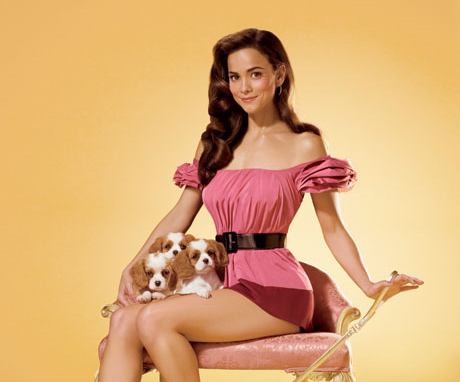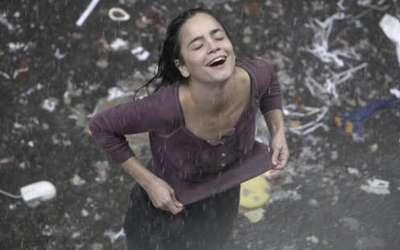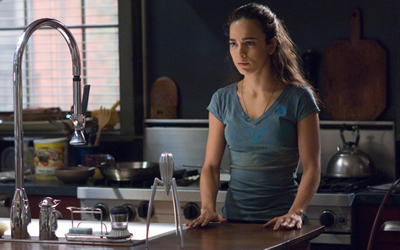Take Three: Alice Braga
 Sunday, July 24, 2011 at 12:27PM
Sunday, July 24, 2011 at 12:27PM Craig here (from Dark Eye Socket) with Take Three. Today: Alice Braga

Take One: Blindness (2008)
As per the José Saramago novel that Blindness is based on, no characters have names in the film, thus Braga is known only as ‘Woman with Dark Glasses’. (Julianne Moore is ‘Doctor’s Wife’; Danny Glover is ‘Man with Black Eye Patch’ etc.) She’s one of a gathering of randomly afflicted people who succumb to a mysterious blindness epidemic. All the cast, however big or small the role, collaboratively convey the exact amount of conviction in their roles. They remain true to their characters’ physical, psychological and emotional positions each step of the way. There’s a defiant ‘all in it together’ aspect, in which each actor instinctively plays off one another in rewarding ways, not least when it comes to Braga.

Two prominent scenes stand out. Both speak volumes about who WwDG is and include intimate exchanges with the two leading characters. The first sees her closeness with Mark Ruffalo’s Doctor take an urgently sensual turn in front of Moore’s seeing Doctor’s Wife (unbeknownst to them). The desperate connection conveyed in both her face and body language suggests a longed for yet sad release; the moment Doctor’s Wife consoles WwDG instead of Doctor is tender and unexpected – and both actresses excel. The second, much later scene sees her *spoiler alert* showering with Doctor’s Wife and First Blind Man's Wife (Yoshino Kimura) after they find their way back to civilised life at the end of the film. The togetherness they experience in this act is vital, joyous, and for WwDG and DW it’s a sensuous embracing of womanhood that, put alongside the above scene, tells us a lot about connection born out of despair. *end spoilers* It’s a lovely moment of closure for the characters, especially Braga’s. Again, she conveys more through her use of minimal expressiveness. It’s a subtle, impressive supporting performance deserving of some praise.
Take Two: City of God/Cidade de Deus (2002)
She’s the niece of cinema’s Lady Braga, Sonia (and her mother is actress Ana Braga), so it’s no wonder Alice here entered the acting arena: she debuted in 1998 with the short Trampolim, and then came a role in one of 2002’s most adored and impacting films, City of God. She’s Angélica, a local girl who falls for two friends: firstly Rocket/Buscapé (Alexandre Rodrigues), a photographer; and then Benny/Bené (Phellipe Haagensen), who’s involved in the drugs trade in violently troubled Rio de Janeiro. Her character arc is minimal, subdued in comparison to the main thrust of the narrative, but she makes each one of her scenes count with joyful vibrancy.

In her brief early appearances in the film – where she lazily hangs out on the beach with Rocket – she’s carefree yet all too aware of, and unaffected by, the criminal events within the city. But later on, leading up to one of the film’s key dramatic moments, she exerts her influence and very nearly gets Bené out of his crime loop with her insistence on them leaving the city to run a farm. A shot of Braga’s despondent face, as Bené moves away from her at his leaving party (and, sadly, toward his fate), works in melancholic opposition to the sunnier countenance she exhibited earlier, in the beach scenes. Her strobe-lit sobbing at the unfortunate turns events take is both disturbing and saddening. Braga’s knowing, brightly memorable turn is affecting enough despite being piecemeal. She justly deserved her supporting nomination for the Cinema Brazil Grand Prize.
Take Three: I Am Legend (2007)
We find out roughly two-thirds of the way in that Will Smith isn’t actually the last person on earth in I Am Legend when Braga, as Anna, pops her head through the smashed window of his crashed truck at South Street Seaport; she does, however, save him from becoming the latest person killed on earth via a horde of ill-conceived and unconvincing CGI vampzomsters, sorry, darkseekers. Anna and her son have followed his radio broadcasts in the hope of finding him and heading on up to Vermont to a maybe- fable survivor settlement.

Although Will Smith gives a heartfelt portrayal of Robert Neville, his character can be referenced in the original text, Richard Matheson’s source novel. Braga doesn’t have an identifiable correlative character, however. (Her equivalent character in the book is Ruth, an uninfected wanderer who Anna bares scant resemblance to.) She has to shoehorn Anna into the world that Francis Lawrence’s film chooses to half-replace the book with. In the many conversation-heavy scenes with Smith (he’s only had his dog and a city full of mannequins to talk to for years – he’s gonna wanna chat) she performs with flair. When he challenges her assumptions, she has an eloquent way of quietly facing off his ranting. And her calmness in the oncoming storm of apocalyptic pale-faced pixel-creatures makes for a nice balance with the fretful panic elsewhere in the film. She brings an unexpected composure and adds a touch of hopeful determination to the film. It’s all-round solid character work.
Three more films for the taking: Lower City (2005), Predators (2010), Repo Men (2010)



Reader Comments (5)
Strange...I probably should have, but I had no idea Alice Braga was the gal in CITY OF GOD.
I feel like this Take Three is a stretch.
I never knew that anyone from City of God made it.
Also, Redbelt.
I'm glad her performance in Blindness was brought up, she was great in that. Really though, great ensemble work from the core group of actors that last until the end of the film. It's a film that was unfairly bashed when it came out (not nearly as terrible as its Tomatometer rating might suggest) but I think a lot of the resistance came from the polarizing nature of a fundamentally experimental film. It's not a masterpiece but it IS rather good and the beautiful ending is earned. Plus, the cinematography is absolutely sublime and truly elevates the experience. Amazing technical work by César Charlone on that front.
Nothing will ever convince me that this woman is a good actress. Or that she's under the age of 30....